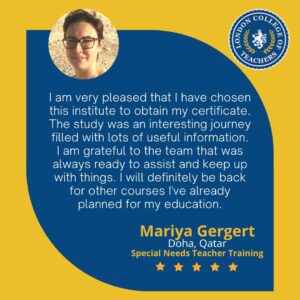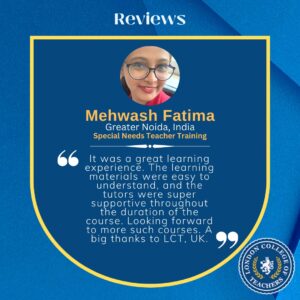Teacher Training: Best Practices in Special Educational Needs
Special Educational Needs or SEN Certificate programs are essential for educating teachers to work with students who have a variety of learning impairments. However, creating efficient SEN teacher training programs requires the cooperation and dedication of districts and schools. In this blog, we’ll look at several ways that districts and schools may help build quality SEN teacher preparation programs, such as by providing financing, materials, and opportunities for cooperation.
We will also look at best practices in this area, including providing ongoing professional development and including community people and families in the training procedure. Schools and districts may make sure that all children receive the instruction and assistance they require for success by making the development of efficient special educational needs courses a high priority.
Why collaboration and professional development is important for Special Education Teachers?
Working together with colleagues enables a diverse range of expertise and viewpoints about a student to be exchanged among those in charge of their learning and welfare. This collective knowledge offers collaborators a more thorough grasp of each student’s requirements, which can be utilized to design and deliver instruction and services more efficiently.
Moreover, general education teachers cannot enhance their proficiency and obtain the necessary expertise to teach students with disabilities without access to professional development and opportunities for collaboration. Also teacher training institute that offers related professional courses are helpful in this aspect.
Why to incorporate evidence-based practices in Special Needs Teacher Training?
Special education evidence-based practices are techniques developed explicitly for students with special educational needs. Some examples of these strategies include reinforcement, self-management, task analysis, and repeated retrieval practice. These strategies are taught to respected teachers via teacher training course provided by institutes or online programs.
Incorporating evidence-based practices in special education can bring about several significant advantages, such as:
- Offering students the most effective education to aid them in achieving their objectives.
- Being based on scientific knowledge and research.
- Providing evidence that educators are doing their utmost to help every student.
- Providing an avenue for personalized education for individual students when required.
Why to individualize teacher training programs to meet diverse student needs?
The phrase “diverse learners” typically denotes students who are English language learners or have exceptionalities, both of which encompass a vast array of skills, abilities, and backgrounds. However, a more comprehensive interpretation of “diverse learners” also encompasses traits such as linguistics, culture, ethnicity, race, gender, and socioeconomics.
Outlined below are five top practices for meeting the needs of diverse students:
- Implementing practical accommodations
- Enhancing accessibility
- Employing culturally responsive teaching techniques
- Utilizing project-based learning
- Conducting formative assessments.
Why creating supportive environments for Special Educational Needs Teachers is necessary?
To ensure that special needs children can achieve their full potential, classroom accommodations are often necessary. In order to create a positive learning environment tailored to their individual needs, it is crucial for educators to be mindful of supporting them in the classroom.
Outlined below are five strategies that special needs educators can utilize to cultivate a positive learning environment in the classroom:
- Develop strong relationships
- Maintain clear communication
- Build trust
- Establish structure
- Offer feedback and reinforcement.
Why to collaborate with Families and Community Partners in Special Educational Needs Teacher Training?
Providing opportunities for parents or families to contribute to a student’s success can be valuable. By involving the family as a partner in supporting the student through their challenges, they can work together to create a plan for the future. This may involve keeping the student focused on their current path or developing a new path to assist them in achieving their goals.
Moreover, offering teacher candidates an opportunity to interact with families of children with disabilities can help achieve five key objectives:
- Enhancing educators’ comprehension of home-school relationships.
- Broadening educators’ understanding of the Least Restrictive Environment concept and its potential.
- Facilitating educators’ acknowledgment and recognition of their own personal beliefs, values, and attitudes.
Offering educators a chance to perceive families as teachers from whom they can learn.
Preparing educators to appreciate that every child and family is distinct, possessing unique strengths, values, and beliefs and facing distinct challenges.
Conclusion
Supporting the development of successful Special Educational Needs (SEN) teacher training programs is critical for ensuring that teachers have the ability and expertise required to help students with various learning needs. Schools and districts can play an important part in this process by providing financing, resources, and chances for collaboration for teachers and trainees. Teachers now have easier access to training and opportunities to further their professional development with the help of online teacher training programs. Schools and districts may ensure that all kids receive a high-quality education and the assistance they require by implementing best practices such as involving families and community members, providing ongoing professional development, and fostering supportive learning environments.








